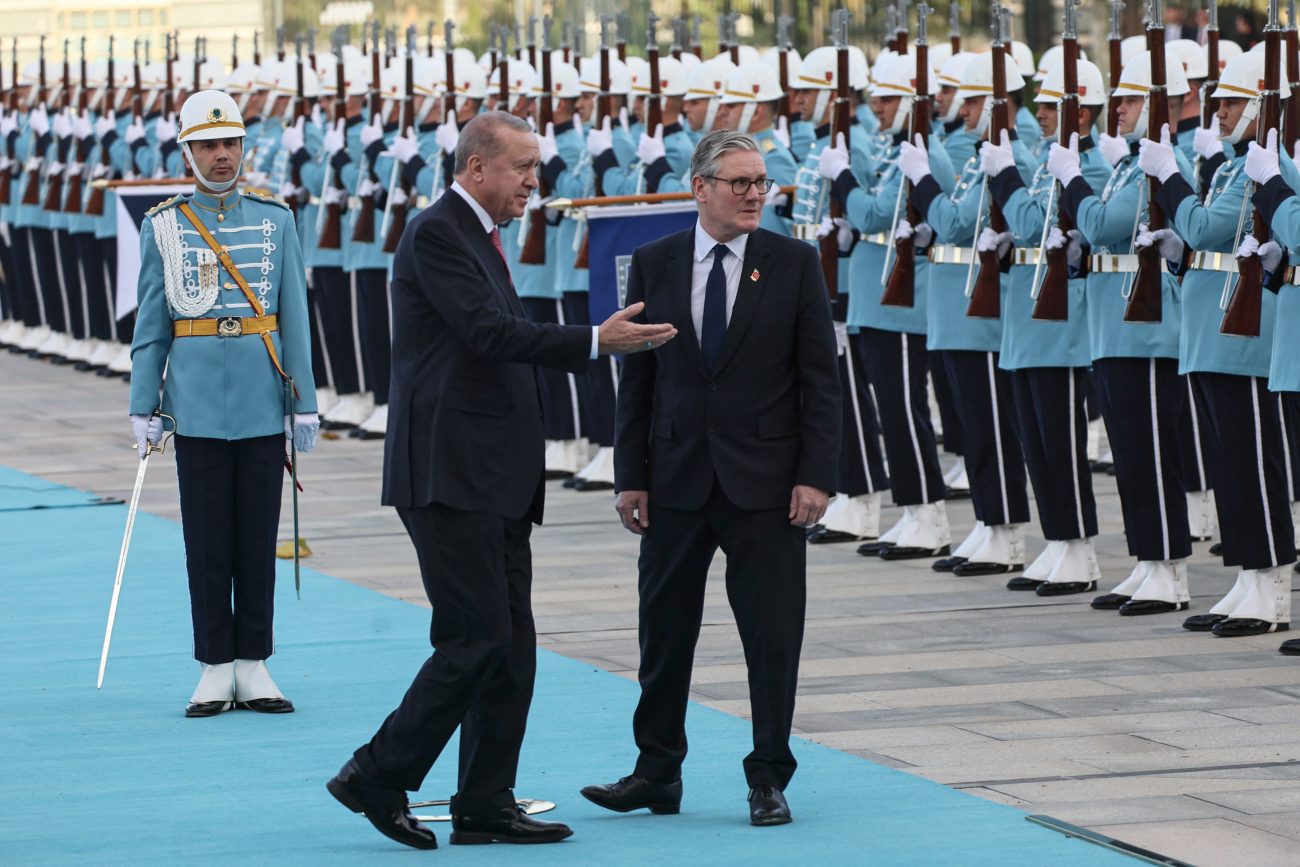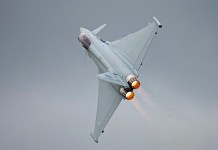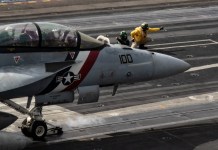British Prime Minister Keir Starmer arrived in Ankara on Monday for high-level discussions with Turkish President Recep Tayyip Erdogan, centered on Turkey’s prospective purchase of Eurofighter Typhoon jets.
The visit underscores Turkey’s strategic push to modernize its air force with European-made aircraft, a move shaped by its expulsion from the U.S. F-35 program and evolving geopolitical priorities.
Starmer touched down at a military airbase near Ankara, a departure from the customary Esenboga Airport used by visiting dignitaries. Accompanying him were UK Defence Minister John Healey and Air Chief Marshal Harv Smyth, head of the Royal Air Force, who were warmly received by their Turkish counterparts.
Turkey is seeking to acquire 40 Eurofighter Typhoons, a multirole fighter jointly produced by the UK, Germany, Italy, and Spain. A Turkish official, speaking anonymously to AFP, confirmed ongoing negotiations and revealed that Britain would transfer an unspecified number of jets to Turkey on Monday.
Defense analysts estimate this initial batch could include two aircraft.
Erdogan and Starmer were scheduled to hold talks followed by a joint press conference later Monday evening, Turkish officials confirmed.
The pursuit of Eurofighters marks a pivotal shift for Turkey’s air force modernization.
“Turkey and the Eurofighter is quite the saga,” said Aaron Stein, president of the Foreign Policy Research Institute, in an interview with AFP. He noted that Ankara had previously declined invitations to join the Eurofighter consortium as an equal partner, opting instead for the U.S. F-35 program.

“Ankara was invited to join the consortium or become an equal member a few times, but they chose the F-35,” Stein explained.
Turkey’s pivot to Eurofighters followed its 2019 expulsion from the F-35 program after purchasing Russia’s S-400 missile defense system.
Initially, Germany blocked the sale of Eurofighters due to Turkey’s position on the Gaza conflict, but Chancellor Friedrich Merz lifted the veto in July 2025, paving the way for the deal.
Turkey’s ambitions extend beyond direct purchases from the Eurofighter consortium. Last week, Erdogan held talks with Qatar’s Emir Sheikh Tamim bin Hamad Al Thani, exploring the possibility of acquiring some of Qatar’s Eurofighters.
Doha ordered 24 Typhoons in 2017, with the final two delivered in 2025, and placed an order for 12 additional jets late last year.
The Qatari emir’s visit to Ankara on Tuesday aims to resolve outstanding issues related to this potential transfer.
Analysts suggest that any deal involving Qatar’s Eurofighters would require British approval, as the jets are part of the consortium’s production framework.
Stein indicated that the jets Britain is transferring to Turkey on Monday may have originally been destined for Qatar.
“They’ll simply be shipped to Turkey,” he told AFP, suggesting a streamlined rerouting of the aircraft.
Beyond defense acquisitions, Erdogan and Starmer are expected to address Gaza’s future. Turkey has expressed interest in joining an international stabilization force for the region, a proposal opposed by Israel.
Israeli Foreign Minister Gideon Saar said Monday that only countries that are “at least fair” to Israel could send troops to secure war-torn Gaza, ruling out Turkey’s participation.
Under a US-brokered ceasefire between Hamas and Israel, a coalition of mainly Arab and Muslim nations is expected to deploy forces in the Palestinian territory devastated by conflict since the October 7, 2023, Hamas attacks across the border.
Turkey has been keen to join a planned international stabilisation force, an idea Israel firmly opposes. Prime Minister Benjamin Netanyahu on Sunday said Israel would decide which countries would be allowed to join the security force.
“I would say that countries that want or are ready to send armed forces should be at least fair to Israel,” Saar said at a press conference alongside his Hungarian counterpart.
“During the last four years and even before that, Turkey, led by (President Recep Tayyip) Erdogan, led a hostile approach against Israel, (that) included not only hostile statements, but also diplomatic and economic measures against Israel,” he said.
“So it is not reasonable for us to let their armed forces enter the Gaza Strip, and we will not agree to that, and we said it to our American friends,” he added.
Meanwhile, the Eurofighter deal represents a critical step for Turkey to bolster its air force capabilities amid shifting alliances and regional challenges. As negotiations progress, the outcomes of Starmer’s visit and subsequent talks with Merz and Qatar’s emir will shape Turkey’s modernization plans.
Earlier in September, U.S. President Donald Trump hosted Turkish President Recep Tayyip Erdogan at the White House, pressing Ankara to cease Russian oil imports amid the Ukraine conflict while dangling the prospect of reversing Ankara’s exclusion from the F-35 fighter program.
The F-35 dispute remains a critical sticking point. Turkey’s S-400 acquisition raised concerns that Russia could gain insight into the jet’s advanced capabilities, prompting the U.S. to impose sanctions on Turkey’s defense industry.
A potential revival of the F-35 deal could bolster Turkey’s air force while signaling a thaw in U.S.-Turkey relations, though any agreement would require careful navigation of NATO’s security concerns.
As both leaders eye mutual benefits—Turkey seeking advanced jets and the U.S. aiming to curb Russian influence —it would be interesting to see who blinks first.
Via Agence France-Presse




